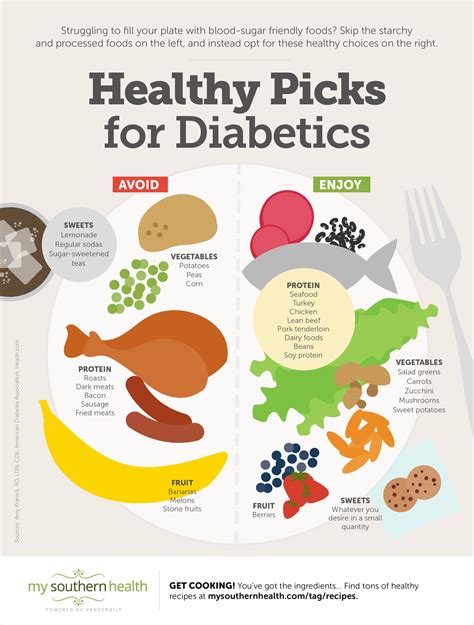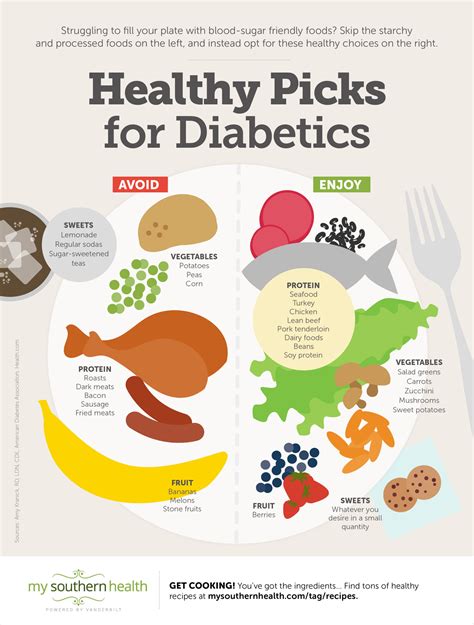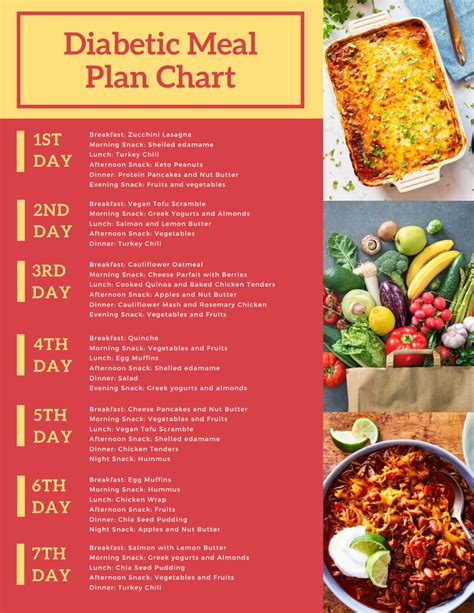Intro
Manage diabetes with 7 expert-approved diet tips, including healthy meal planning, carbohydrate control, and sugar management, to regulate blood sugar levels and improve overall health.
Managing diabetes requires a comprehensive approach that includes a healthy diet, regular exercise, and medication, if prescribed. A well-planned diabetic diet is crucial for controlling blood sugar levels, maintaining a healthy weight, and preventing complications associated with diabetes. In this article, we will explore 7 diabetic diet tips that can help individuals with diabetes manage their condition effectively.
A diabetic diet is not about deprivation or sacrifice, but rather about making informed food choices that promote overall health and well-being. By understanding the principles of a healthy diabetic diet, individuals can develop a personalized eating plan that meets their unique needs and preferences. With the right approach, it is possible to manage diabetes, prevent complications, and improve overall quality of life.
Developing a healthy relationship with food is essential for managing diabetes. This involves learning about different food groups, understanding how various nutrients affect blood sugar levels, and developing strategies for making healthy choices in different situations. By taking control of their diet, individuals with diabetes can reduce their risk of complications, improve their overall health, and enhance their well-being.
Understanding the Principles of a Diabetic Diet

A diabetic diet is based on several key principles, including eating a variety of whole, unprocessed foods, monitoring carbohydrate intake, and staying hydrated. Whole foods, such as vegetables, fruits, whole grains, lean proteins, and healthy fats, provide essential nutrients, fiber, and satiety, making it easier to manage blood sugar levels and maintain a healthy weight. By focusing on whole foods and limiting processed and packaged items, individuals with diabetes can reduce their risk of complications and improve their overall health.
Key Components of a Diabetic Diet
A healthy diabetic diet typically includes: * A variety of colorful vegetables, such as leafy greens, bell peppers, and carrots * Fresh fruits, such as berries, citrus fruits, and apples * Whole grains, such as brown rice, quinoa, and whole-wheat bread * Lean protein sources, such as poultry, fish, and legumes * Healthy fats, such as avocado, nuts, and olive oil By incorporating these foods into their diet, individuals with diabetes can provide their bodies with the necessary nutrients, fiber, and energy to function properly.7 Diabetic Diet Tips

Here are 7 diabetic diet tips that can help individuals with diabetes manage their condition effectively:
- Eat regular meals: Eating regular meals can help regulate blood sugar levels and prevent extreme highs and lows. Aim for three main meals and one or two snacks per day, spaced evenly apart.
- Choose complex carbohydrates: Complex carbohydrates, such as whole grains, fruits, and vegetables, are rich in fiber, vitamins, and minerals, and can help regulate blood sugar levels. Examples of complex carbohydrates include brown rice, quinoa, whole-wheat bread, and leafy greens.
- Incorporate lean protein sources: Lean protein sources, such as poultry, fish, and legumes, can help regulate blood sugar levels and provide essential amino acids for muscle growth and repair.
- Healthy fats are essential: Healthy fats, such as avocado, nuts, and olive oil, can help regulate blood sugar levels, provide energy, and support heart health.
- Stay hydrated: Staying hydrated is essential for overall health, and can help regulate blood sugar levels. Aim for at least eight glasses of water per day, and limit sugary drinks.
- Be mindful of portion sizes: Eating large portions can lead to overconsumption of calories, carbohydrates, and fat, which can worsen diabetes. Use a food scale or measuring cups to measure portion sizes, and eat slowly and mindfully.
- Get enough fiber: Fiber can help regulate blood sugar levels, promote satiety, and support healthy gut bacteria. Aim for at least 25 grams of fiber per day from sources such as fruits, vegetables, whole grains, and legumes.
Benefits of a Diabetic Diet
A well-planned diabetic diet can provide numerous benefits, including: * Improved blood sugar control * Weight management * Reduced risk of complications, such as heart disease, kidney disease, and nerve damage * Improved overall health and well-being By following these 7 diabetic diet tips, individuals with diabetes can take control of their condition, reduce their risk of complications, and improve their overall quality of life.Creating a Personalized Diabetic Meal Plan

Creating a personalized diabetic meal plan involves several steps, including:
- Consulting with a healthcare provider or registered dietitian: A healthcare provider or registered dietitian can help individuals with diabetes develop a personalized meal plan that takes into account their unique needs, preferences, and health goals.
- Assessing nutritional needs: Assessing nutritional needs involves determining the individual's daily calorie, protein, fat, and carbohydrate requirements.
- Setting health goals: Setting health goals, such as improving blood sugar control or losing weight, can help individuals with diabetes stay motivated and focused.
- Developing a meal plan: Developing a meal plan involves creating a daily eating schedule that includes a variety of whole, unprocessed foods, and takes into account the individual's nutritional needs and health goals.
- Monitoring progress: Monitoring progress involves tracking blood sugar levels, weight, and other health metrics to ensure that the meal plan is effective and making adjustments as needed.
Common Challenges and Solutions
Common challenges that individuals with diabetes may face when creating a personalized meal plan include: * **Limited time for meal planning and preparation**: Solutions include preparing meals in advance, using a slow cooker, or keeping a stash of healthy snacks on hand. * **Limited budget**: Solutions include shopping for seasonal produce, using coupons, or buying in bulk. * **Limited access to healthy food options**: Solutions include shopping at local farmers' markets, using a community-supported agriculture (CSA) program, or growing your own fruits and vegetables.Staying Motivated and Accountable

Staying motivated and accountable is essential for maintaining a healthy diabetic diet. Here are some tips for staying motivated and accountable:
- Keep a food diary: Keeping a food diary can help individuals with diabetes track their eating habits, identify patterns and challenges, and make informed decisions about their diet.
- Join a support group: Joining a support group can provide individuals with diabetes with a sense of community, connection, and motivation.
- Celebrate successes: Celebrating successes, no matter how small, can help individuals with diabetes stay motivated and encouraged.
- Seek professional help: Seeking professional help from a registered dietitian or healthcare provider can provide individuals with diabetes with personalized guidance, support, and accountability.
Conclusion and Next Steps
In conclusion, managing diabetes requires a comprehensive approach that includes a healthy diet, regular exercise, and medication, if prescribed. By following these 7 diabetic diet tips, individuals with diabetes can take control of their condition, reduce their risk of complications, and improve their overall quality of life. Next steps include consulting with a healthcare provider or registered dietitian, creating a personalized meal plan, and staying motivated and accountable.What is a diabetic diet?
+A diabetic diet is a eating plan that is designed to help individuals with diabetes manage their condition, regulate their blood sugar levels, and prevent complications.
What are the key components of a diabetic diet?
+The key components of a diabetic diet include a variety of whole, unprocessed foods, such as vegetables, fruits, whole grains, lean proteins, and healthy fats.
How can I create a personalized diabetic meal plan?
+Creating a personalized diabetic meal plan involves consulting with a healthcare provider or registered dietitian, assessing nutritional needs, setting health goals, developing a meal plan, and monitoring progress.
We hope this article has provided you with valuable information and insights on managing diabetes through a healthy diet. If you have any questions or comments, please don't hesitate to reach out. Share this article with your friends and family who may be struggling with diabetes, and let's work together to promote healthy living and disease prevention.
